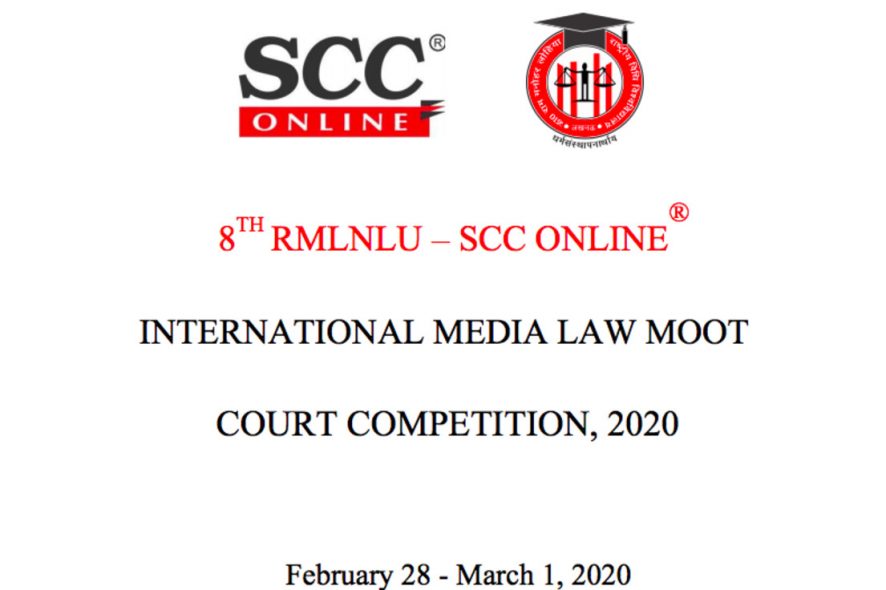About the Competition
Dr. Ram Manohar Lohiya National Law University, Lucknow is hosting the 8th Edition of the International Media Law Moot Court Competition in collaboration with SCC Online. Ever since the 1st edition in the year 2013, the student community of National Law University, Lucknow puts in days of focused effort to organise this moot court competition which acts as the University’s contribution to the mooting fraternity of national law universities. It is very encouraging to see the participation increase consistently with every passing year. This year 32 teams from across the Indian sub-continent will be taking part in the competition. The teams vie for 4 categories of awards – Winners, Runners Up, Best Oralist and Best Memorial with Prizes ranging from INR 5,000 to 25,000.
This year’s moot problem has been drafted by, Mr. Hari Krishnan, an alumnus of National Law University, Lucknow, batch of 2013. Mr. Krishnan is now a practicing advocate at the Kerela High Court. The Moot Court Competition has come to fruition through the untiring support and dedication of the University’s Moot Court Committee (MCC) headed by the Joint Convenors, Harsh Singh, Priyanka Rai and Shubhangi Agarwal of the 5th Year.
Day 1 – The Opening Ceremony
6:00 PM : The inaugural ceremony of the Competition was graced by the benign presence of Mr. Sumeet Malik, the Director of Eastern Book Company along with Prof. (Dr.) Subir K. Bharnagar, the Vice Chancellor of the University, Mr. Amit Kumar Mishra, Registrar of the University, Dr. Atul Kumar Tiwari, the Chairperson of the MCC and Dr. Prasenjit Kundu, Faculty Co-ordinator of the MCC. All the dignitaries were duly felicitated on stage amidst thunderous applause.
6:10 PM : The esteemed dignitaries declared the Competition ‘open’ by lighting the lamp on the auspicious occasion.
6:15 PM : Mr. Sumeet Malik delivered the Welcome Address, which was filled with appreciation for the co-operation extended by the University in making this event a success. He also thanked the MCC for their collaborative outlook and professionalism in organising an event at this scale.
6:20 PM : Prof. (Dr.) Subir K. Bhatnagar addressed the gathering, boosting the morale of all participants. He also thanked The Eastern Book Company and SCC Online for their continued support to the Moot Court Competition.
7:00 PM : The participants were briefed and the after a short while the Match-ups were released post which Memorials were exchanged. The palpability in the room was conspicuous and the teams eyed each other up and proceeded to a hurried dinner and an uneasy sleep, understandably, owing to the mounting nervousness of presenting a case at court tomorrow.
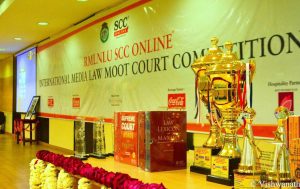
Day 2 : The Judges’ Briefing and Preliminary Rounds
10 AM : The judges, some experienced senior advocates, other, partners and associates at reputed law firms, filed into the Conference hall, whisked in by the cool morning breeze, to be briefed on the Moot Proposition. Mr. Hari Krishnan took to stage and delivered an insightful monologue delving into the intricacies of an increasingly interesting proposition centered around the freedom of press and speech.
11 AM : The marking scheme having been explained and the clocks set, with a blaring All Rise! The judges alighted to their benches. The hour marked the commencement of Preliminary Round – 1, wherein 32 teams faced off with some of the best law schools of the sub-continent.
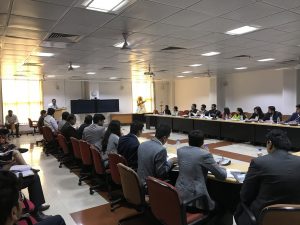
11:05 AM : Preliminary Round 1
Room No. 1 : Last year’s finalists National Law University, Jodhpur squared up against the equally talented team of VIPS. The judges seemed well versed with the intricacies of the problem and questioned the participants on the particulars of the law and its authoritative backing. The participants answered to the best of their ability and the judges were thus thoroughly impressed.
Room No. 5 : National Law University, Delhi faced off against Tamil Nadu Dr. Amedkar Law University. The judges engaged in some grilling questioning, which was dealt with confidently by the counsels. The counsels attempted their best to try and satisfy the judges of the legal backing to their arguments, which would have been reduced to mere conjecture otherwise.
Room No. 15 : 7th Edition’s winners, WBNUJS had a challenging round against Nirma Law University. The judge in the room, Mr. Sarthak Raizada grilled the counsels in order to extract the most cogent arguments. The participants gained invaluable experience in the art of answering the queries of the judges with precision and brevity.
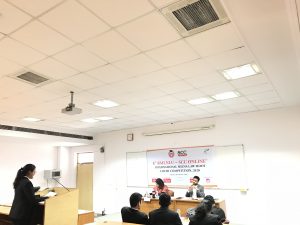
2:00 PM : Preliminary Round 2
Room No. 15 : Tamil Nadu Dr. Amedkar Law University was up against Symbiosis Law School Pune. The participants presented articulate arguments that convinced the judges as to their assertions, backed by the proper authority of law. Both the teams were equally matched in research and it all came down to the skills of oral presentations.
Room No. 7 : Christ University v. GNLU, Gandhinagar was a neck to neck battle between two premier law schools. The judge, Ila Sheen focused on various peculiarities of law that prompted the participants to come up with several interesting arguments.
Room No. 8 : NLIU Bhopal v. NALSAR was one of the best preliminary rounds of the competition. The teams presented stellar arguments which seemed well researched. Two very strong teams went head to head for a chance to break into the quarter-finals, but only time will tell when the breaks are announced at 5 PM.
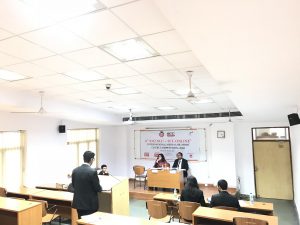
5:00 PM :The Quarterfinals Breaks
After a gruelling two rounds of tough questions and confident rebuttals the teams that have broken into the Quarterfinals of the 8th RMLNLU SCC Online International Media Law Moot Court Competition, with their iron clad cases are-
GNLU, Gandhinagar
SLS, Pune
NLU, Jodhpur
NALSAR, Hyderabad
TNNLS
DNLU, Jabalpur
NUALS, Kochi
NMIMS, Mumbai
The Quarterfinals will begin shortly.
6:00 PM : The Quarter Finals
6:17 PM : Room No.1 : GNLU, Gandhinagar was up against NMIMS, Mumbai in the quarterfinals round being judged by Mr. Neel, Mr. Sarthak Raizada and Mr, Ahmed Aslam, all of whom are very experienced lawyers in their own right. The judges questioned the counsels on the facts of the case and made it increasingly tricky for the counsels to evade the facts that went against their case. Hence, teaching them the much valued art of thinking on ones feet. The counsels however, regained lost ground in the rebuttals that followed their speeches.
6:30 PM : Room No. 2 : The room witnessed the round between Symbiosis Law School, Pune and NUALS, Kochi. The bench comprised of Ms. Garima Prakash, Mr. Victor Das and Mr. Ruchur. The judges seemed exceptionally well versed with the facts and principles of law being applied to the case at hand. Ms. Garima Prakash questioned the counsels on the principles of law extensively. The various tests applied by the counsels to satisfy the queries of the bench were indicative of the well-researched case being argued in the round.
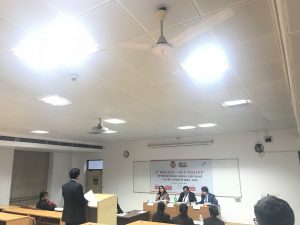
6:44 PM : Room No. 3 : Last year’s finalists National Law University, Jodhpur squared up against DNLU, Jabalpur. The round was judged by the learned bench comprising of Mr. Aayush, the Ex-Convenor of the Moot Court Committee of National Law University, Lucknow Mr. Sajal Agarwal and Mr. Kaustubh. This round brought out several interesting insights into the characteristics of the problem and their argumentation. The judges emphasised on value of Social Context judging in reference of the contextual environment created by the facts of a moot proposition. The weighing and balancing of rights of the two parties was also emphasised by the judges when evaluating the value of the arguments presented by the counsels.
7:00 PM: Room No. 4 : NALSAR, Hyderabad faced off with TNNLS in an exciting quarter-finals. The learned bench was co-chaired by Ms. Divya Swamy Mr. Mohit Negi and Mr. Anchit Tripathi, all of whom are masters of Constitutional law and therefore inquired of off the counsels to elucidate on very specific and apt points of law. A general trend had set in towards the end of the quarters, wherein the judges were extremely eclectic in admitting arguments. This is indicative of the increased standards of judging as the rounds progress. In toto, this new found judicial attitude of the judges will benefit the counsels by acting as a gainful experience for them and aiding them in enhancing their skills of argumentation and articulation.
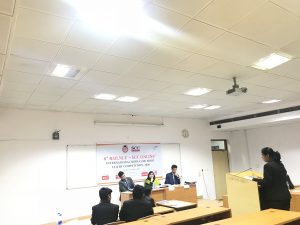
9 PM : The teams had a hearty meal and an amazing opportunity to network and socialise with the judges and their fellow participants, post which all the teams proceeded to their respective accommodation to prepare for the crucial semi-final rounds, scheduled to begin at 11 AM tomorrow.
Day 3 : The Semi-finals, Finals and Closing Ceremony
11 AM : The Semi-finals
11:15 AM : Room No. 1 : The match-up between NMIMS and National Law University, Jodhpur was a remarkable display of skills of oral argumentation and in-depth legal research. Judged by the learned bench comprising of Mr. Nadeem Murtuza, Mr. Raghenth Basant and Mr. Hari Krishnan. Both the teams were equally matched in their attempt to present bullet-proof cases to the judges. However, the judges were precise in seeking loopholes in their narratives by trying to catch every mis-step of the counsels. However, the lucidity of arguments presented by the two sides aided in helping them regain lost ground. The participants were questioned extensively on the exceptions to the law, in order to ascertain their depth of knowledge. The judges seemed pleased with the ancillary issues presented by the counsels to support their central argument. The issue of weighing the legal rights was a reoccurring theme throughout the course of argumentation and the balancing of competing interests was of paramount importance. This was reflective of the participant’s thoroughness of the law applied. By covering the finer points of the law, the all four counsels covered all possibilities and contingencies to the case at hand and hence concluded a hard-fought semi-finals round.
12 PM : Room No. 2 : TNNLS versus NUALS Kochi was a fierce round of arguments and counter-arguments. The panel comprised of Mr. Sarthak Raizada, Mr. Akila Agarwal and Mr. Singh. The counsels had to balance time-management with the plethora of issues to be dealt with. Fine speaking skills were put on display by the participants. The learned judges placed emphasis on the fragility of according primacy to rights over duties placed in the social context within which the proposition was based. The teams cited various authorities to back their arguments, to the satisfaction of the bench and as a counter to the contentions of the opposing counsels. It was a closely contested round which came down to the rebuttals in the finals minutes of the round. The round was hard fought, adding to the anticipation of the results.
1 PM : The results for Semi-final rounds will be declared shortly after a delicious lunch.
1:30 PM : The much awaited results of the Semi-finals have been declared, the teams making it to the Finals of 8th RMLNLU SCC Online International Media Law Moot Court Competition are –
NMIMS, Mumbai
NUALS, Kochi
3:30 PM : The Final Rounds : Moot Court Hall
The finals were a mesmerising presentation of exemplary skills of argumentation by two premier law schools, NMIMS, Mumbai and NUALS, Kochi. The rounds were judged by Hon’ble Mr. Justice M.N. Bhandari of the Allahabad High Court, Mr. Upendra Nath Mishra, Senior Advocate at Allahabad High Court (Lucknow Bench), Mr. Sudeep Seth, Senior Advocate at Allahabad High Court (Lucknow Bench), Mr. Jaydeep Narayan Mathur, Senior Advocate at Allahabad High Court (Lucknow Bench) and Mr. Hari Krishnan, the problem drafter and an advocate at the Kerala High Court.
The plaintiffs, NMIMS, Mumbai presented their submissions first –
3:30 PM : Speaker 1
The counsel began their submissions with a brief of facts to acquaint the bench with the particulars of the context within which the case is to be argued. The speaker then went on to systematically list out the issues to be argued by the counsel and the co-counsel hence lending a comprehensible structure to the method of argumentation. The case dealt with general theme of the freedom of speech of the press and whether the restrictions placed on it are valid under law.
At this juncture the bench requested the counsel to identify the authorities of law cited and whether they clashed with the ideals of journalistic integrity. The judges emphasised on the disclosure of the source of the article and whether such non-disclosure was antithetical to the standards of journalistic integrity. The counsel dealt with the queries raised by the learned bench, gracefully and the court mannerisms and etiquettes were on full display during the course of argumentation.
The counsel argued that the blanket ban on publication of criticism against the government is a violation of Articles 14 and 19 of the Flavian Constitution (context of the Moot Proposition) and Article 19 of ICCPR, which collectively protect the freedom of press.
The counsel proceeded in their attempt to convince the judges by stating that the restriction of publication put by the government did not follow the procedure prescribed by the law of the land. The disproportionality of the blanket ban was the central argument presented by the counsel for the plaintiffs in order to strengthen their case.
The counsel submitted to the reasonable restrictions that may be placed on the fundamental right of freedom of speech and the freedom of press, yet succeeded in making their case by illustrating with the help of case laws that such reasonable restrictions are narrow and can only be placed in situations that threaten public order and national security. Thus, this being a blanket restriction cannot be reconciled with the principle of reasonable restriction.
4:00 PM : Speaker 2
The co-counsel elucidated the test of reasonableness and proportionality and contended that the anonymity of the article in question must be maintained since it posed no threat to National Security in the present situation, hence rendering the ban disproportionate.
The co-counsel added that the ban must fulfil the Test of Reasonability and therefore the Government should have to resorted to a least restrictive approach. The complete denial of all forms of criticism, whether substantiated or otherwise is violative of the well settled principles of free speech.
The judges queried the counsel on the extent of accountability afforded to the holder of a public office holder vis-à-vis a private citizen. The co-counsel satisfied the bench by establishing through case laws that the holder of a public office, such as the President of a country shares a greater accountability to the public in comparison to a private citizen. Therefore, the government must prove a larger public interest to justify the disclosure of the author and shed the defence of anonymity. The subsequent arguments of the co-counsel addressed the balancing of state interest and individual right. The co-counsel attempted to justify the vagueness of the restriction on publication by citing the landmark judgement of Sunday Times v. United Kingdom. The co-counsel, contented further that the government order served no legitimate aim and in the absence of sedition, a reasonable restriction can only be placed on those instances which directly violate public order. Therefore, by providing a wide perspective of the general narrative argued by the Plaintiff’s the co-counsel rested their case. Lastly, the counsel defined public order on the basis of the landmark judgement of Kedarnath v. State of Bihar wherein an incitement of violence that may potentially lead to a protest-like situation may be restricted validly under law. The counsel also contended that the reasonable standards of truth were applicable in the said case and therefore the article containing allegations against the President do not amount to sedition on the basis of the application of the Brandenburg test.
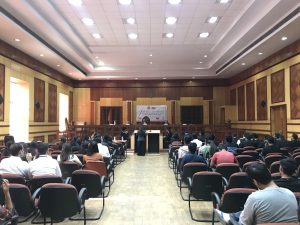
The Respondents NUALS, Kochi presented the counter arguments next –
5:00 PM : Speaker 1
After a stellar performance by the Plaintiffs, the counsel for the government had their work cut out for them. The counsel stated that strong wordings that have the propensity to incite violence must be restricted and is covered under the principles of reasonable restrictions. Moreover the counsel argued that the allegations made by the plaintiff’s client in the anonymous article against The President are mere assertions that are baseless and therefore violate journalistic ethics.
The counsels further substantiated their arguments by stating that the publication led to violent protests. The Lordships were of the opinion that a total restraint will shut down fair criticism and hence fair criticism should not be stifled. The counsel however, countered by stating that false information, propagated without evidentiary basis should be liable for defamation. The case argued by the counsel rested on the bed rock of reconciliation of illegality of defamation and the freedom of speech of the press.
The counsel defined that the national security of a State is considered endangered when a grave threat hangs over the very the existence of such State. However, ‘national security’ cannot be provided with a rigid definition. The counsel argued that the circumstances as made evident by the Moot Proposition are such that a valid restrain may be imposed, in interest of national security. The counsel further added that the allegations of procedural impropriety, by the plaintiffs, have been made without a substantial basis. With this the counsel rested their case and handed the podium to the co-counsel.
5:30 PM: Speaker 2
The co-counsel for the government stated that the disclosure of documents to rebut the veracity of the allegations by the plaintiff’s client in the anonymous article will prove detrimental to national security. Moreover, such documents of the Cabinet and governmental policy decisions are protected from public disclosure by law. The learned bench, however stated that public interest may override such a protection afforded by the law.
Proper procedure under right to information act has not been followed. The indispensability of proper procedural law. The right to information and the intricacies and applicability of its laws were pondered upon by the learned bench.
6:00 PM: The arguments of the both the sides, concluded, the bench now had to make a decision.
7:00 PM : The Closing Ceremony and Declaration of Results
Nervousness hung in the air as the teams filed into the Seminar Hall for the declaration of results. After a brief address by Hon’ble Justice Mr. M.N. Bhandari, wherein His Lordship highlighted the importance of moots and the legal acumen of budding lawyers that mooting as an activity aids in developing, the results of the 8th RMLNLU SCC Online International Media Law Moot Court Competition were declared –
Best Memorial – National Law University, Jodhpur
Best Speaker – Symbiosis Law School Pune, Aakruti Jayendran
Runner’s Up – NMIMS, Mumbai
Winner – NUALS, Kochi
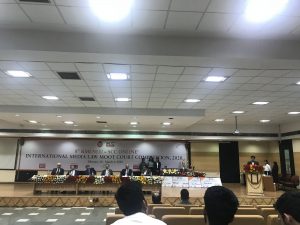
NUALS, Kochi repeated history by winning the RMLNLU SCC Online International Media Law Moot Court Competition for a second time and thus concluded another successful edition of the sub-continent’s most reputed Moot on International Media Law.
Reported by – Vatsal Raj
Member, Moot Court Committee
National Law University, Lucknow.



